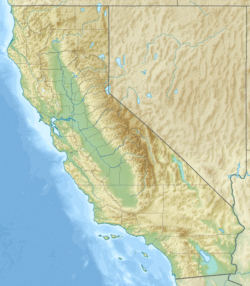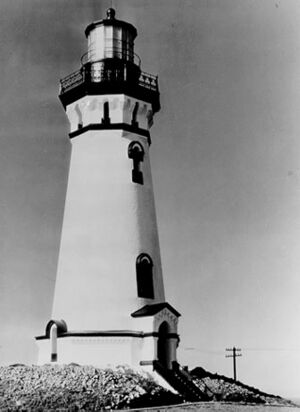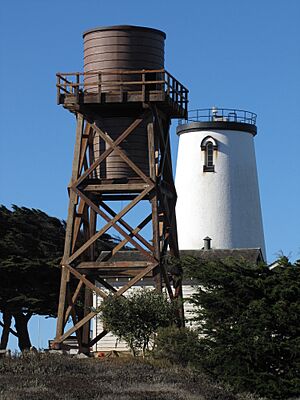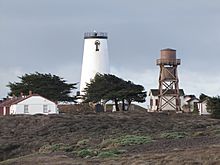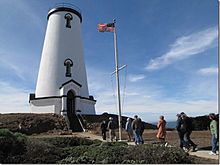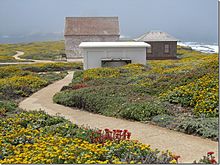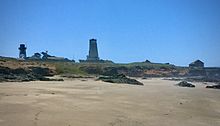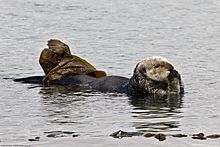Piedras Blancas Light Station facts for kids
The Piedras Blancas Light Station is a historic lighthouse found on a beautiful point of land called Piedras Blancas. It's about 5.5 miles northwest of San Simeon, California. In 2017, this special place became part of the California Coastal National Monument, which helps protect important coastal areas.
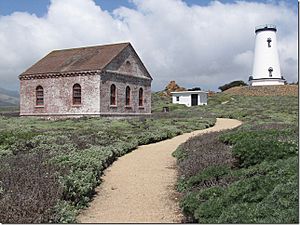 |
|
| Piedras Blancas Light Station | |
|
|
|
| Location | Point Piedras Blancas San Simeon California United States |
|---|---|
| Coordinates | 35°39′56.3″N 121°17′03.6″W / 35.665639°N 121.284333°W |
| Year first constructed | 1875 |
| Automated | 1975 |
| Foundation | masonry basement |
| Construction | brick tower |
| Tower shape | conical tower |
| Markings / pattern | white tower, black trim |
| Height | 70 feet (21 m) |
| Focal height | 142 feet (43 m) |
| Original lens | First order Fresnel lens made by Henri Lapaute |
| Current lens | VRB-25 |
| Characteristic | Fl W 10s. |
| Admiralty number | G3982 |
| ARLHS number | USA-598 |
| USCG number | 6-0265 |
Contents
History of the Piedras Blancas Lighthouse
The very first light from the Piedras Blancas lighthouse shone on February 15, 1875. It used a special type of lens called a Fresnel lens. This lens was designed to make the light very bright and visible far away.
When it was first built, the lighthouse stood about 100 feet tall. But over the years, earthquakes caused damage to the structure. On December 31, 1948, a big earthquake hit nearby. Because of the damage, the top three sections of the lighthouse had to be removed.
Now, the lighthouse is about 70 feet tall. The original lens was moved and is now on display in the nearby town of Cambria. In 1906, a sound signal was added to help ships navigate in foggy weather.
Who Manages the Lighthouse?
In 1939, the lighthouse's management changed. It went from the United States Lighthouse Service to the United States Coast Guard. Then, in 1975, the light became automated. This meant it no longer needed people to operate it, and the sound signal was removed.
Later, in 2001, the Bureau of Land Management (BLM) took over. Their job is to:
- Allow people to visit the lighthouse.
- Let scientists continue their research there.
- Restore the lighthouse to how it looked between 1875 and 1940.
A group called the Piedras Blancas Light Station Association helps the BLM. They are a non-profit group that raises money to help restore and maintain the lighthouse.
Today, the lighthouse still helps guide ships. It uses a modern light called a Vega VRB-25 that flashes every 10 seconds. The light station is also a historic park and a wildlife sanctuary. It has been named an Outstanding Natural Area.
Visiting the Lighthouse
You can visit the 19-acre site on guided tours. These tours happen every Tuesday, Thursday, and Saturday, except on federal holidays. From June 15 to August 31, tours are also offered on Mondays.
- The fee is $10 for adults.
- For ages 6 to 17, it's $5.
- Kids aged 5 and under can visit for free.
If you have a group of 10 or more, you can arrange a special tour. The tour lasts about two hours. You'll see the historic lighthouse and other buildings. You can also watch wildlife and enjoy the amazing views along an easy half-mile trail.
Piedras Blancas Elephant Seal Rookery
About a mile south of the lighthouse, you'll find the biggest elephant seal rookery on the West Coast. A rookery is a place where animals gather to breed. This one is located along California Highway One.
There's a large parking area and a boardwalk, making it easy to see the elephant seals. Volunteers from Friends of the Elephant Seal are often there. They can tell you all about the seals you're watching. This viewing area is open all year round.
Marine Protected Areas Nearby
Offshore from the Piedras Blancas Light Station are the Piedras Blancas State Marine Reserve and Marine Conservation Area. Think of these as underwater parks! These special areas help protect ocean wildlife and marine ecosystems, keeping the ocean healthy.
Gallery


